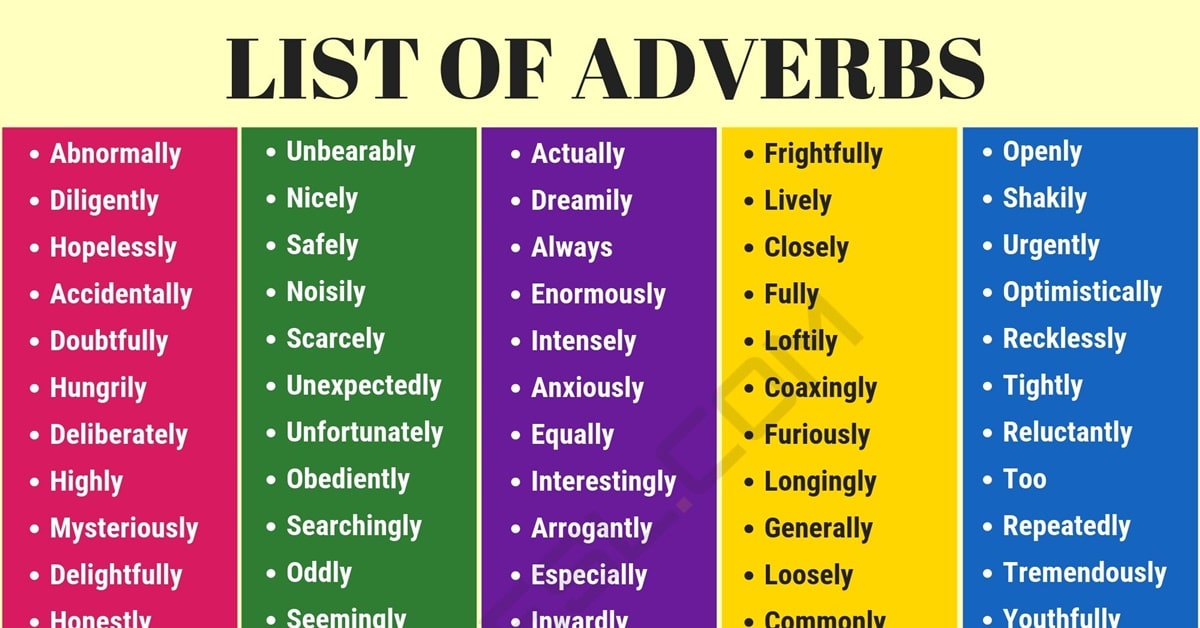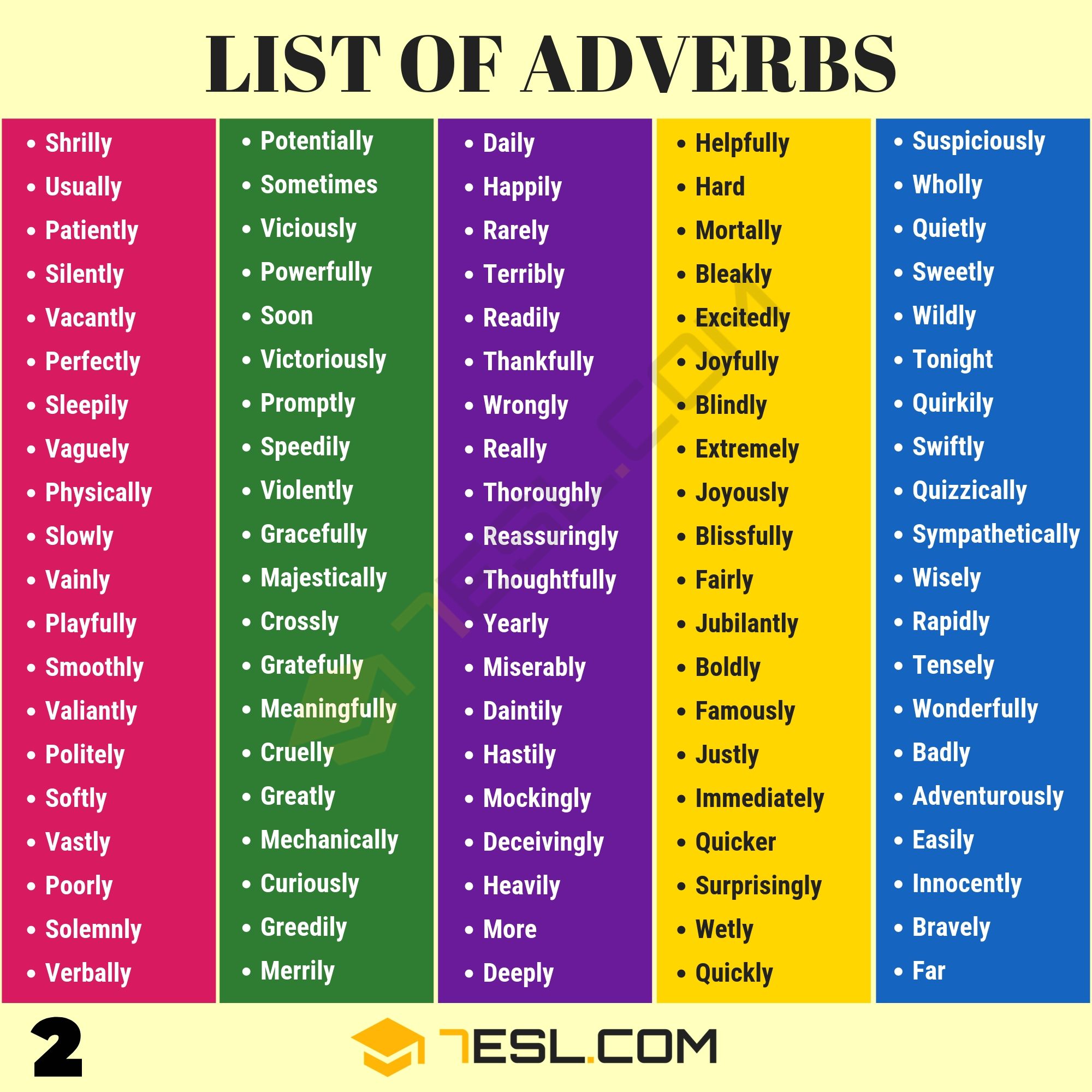In this article, you are going to be presented with a comprehensive list of adverbs to add to your vocabulary. If you are trying to be specific about certain actions in speech or writing, you are going to want to use adverbs. Adverbs are parts of speech that modify other parts of speech, such as verbs, adjectives, or even other adverbs. But what exactly are adverbs and how do you use them? This article will illustrate what adverbs are, as well as give a list of adverbs based on their different uses.
List of Adverbs
What Is An Adverb?
An adverb is a part of speech (a word or a phrase) that qualifies or modifies a verb, adjective, preposition, clause, sentence, determiner, or another adverb. Adverbs are used to show the degree, frequency, manner, time, and place (among other things) of actions (verbs) or other parts of speech.
Adverbs can answer questions about the other parts of speech. They can tell “how?” or “how so?” in reference to verbs, or “where?” and “when?” in reference to verb phrases. They can also serve as an expression of quantity or manner, answering “to what extent?” or “in what way?”.
Because of this, adverbs are divided into different categories according to their use. There are adverbs of frequency, adverbs of manner, adverbs of time, adverbs of place, adverbs of degree, adverbs of evaluation, and conjunctive, or linking, adverbs.
Adverbs will also typically use an -ly- ending, making them somewhat easy to identify. Examples like this include adverbs such as quickly, rightly, kindly, and carefully. This is not always the case, however, and an exploration of adverbs in their respective adverb categories will follow.
List of Adverbs of Frequency
Adverbs of Frequency are adverbs that describe how frequently an activity is done. There are degrees to which certain activities can be done, (from always to never, for example) and words for each degree. A list of adverbs describing most frequent actions to least frequent actions would include:
- always
- usually
- normally/generally
- often/frequently
- sometimes
- on occasion/occasionally
- seldom/hardly ever
- rarely, and
- never.
If there is a definite frequency of regular occurrence, adverbs describing this are known as Adverbs of Definite Frequency. They include words/phrases like:
- daily
- weekly
- monthly
- yearly
- every day
- every two hours
- once a week, etc.
List of Adverbs of Manner
Adverbs of manner describe how something happens, or how someone does something. They are one of the largest groups of adverbs and can include the -ly- ending (or not). Here are some examples:
- gladly
- gently
- quietly
- safely
- truthfully
- warmly
- wildly
- carefully
- wisely
- hard
- fast
- straight
- well
- angrily
- boldly
- daringly, etc.
List of Adverbs of Time
Adverbs of time include adverbs of frequency but can also include definite points of time or indefinite relationships in time. Adverbs of time include words like:
Definite points of time
- yesterday
- today
- tomorrow
- tonight
- now
- then
- this morning
Indefinite relationships in time
- before
- later
- since
- soon
- still
- yet
- early
- earlier
- eventually
- recently
- previously
- finally
List of Adverbs of Place
Adverbs of place tell when something happens or is happening. They include words like:
- above
- behind
- below
- on
- down
- up
- far
- in
- outside
- towards
- under
- upstairs
- back
- over
- away
- off, etc.
They also can include words that indicate a direction, like forward, aftward, backward, downward, homeward, eastward, or upward. In addition, words like somewhere, nowhere, everywhere, and anywhere are included as adverbs of place.
List of Adverbs of Degree
Adverbs of degree are associated with intensity. They include words like:
- extremely
- almost
- quite
- just
- too
- enough, and
- very.
These words can also modify adjectives (“very ambitious”) or be used to describe a needed degree (“enough bread”).
List of Adverbs of Evaluation
Adverbs of evaluation put forth a subjective view. They are also known as commenting adverbs and can express attitudes, judgments, or degrees of certainty. They include words like:
- apparently
- clearly
- presumably
- probably
- frankly
- unfortunately
- hopefully
- bravely
- rightly
- wrongly
- stupidly
- luckily
- sadly
- fortunately
- unbelievably, etc.
List of Conjunctive Adverbs (Linking Adverbs)
Conjunctive adverbs connect two clauses — especially when the first clause’s meaning influences the meaning of the second clause. This includes words like:
- therefore
- thus
- accordingly
- indeed
- finally
- however
- thereby
- consequently
- subsequently
- indeed
- now
- nevertheless
- nonetheless, etc.
Usually, conjunctive adverbs can relate two ideas (of two separate clauses) in a singular phrase. For example “It rains in London often, therefore, most people there carry umbrellas.” is an instance of using the conjunctive adverb “therefore” in context.
Adverbs List (from A-Z)
Here you will find more than 250 common adverbs to help you improve your English grammar and vocabulary.
- Abnormally
- Abruptly
- Absently
- Accidentally
- Accusingly
- Actually
- Adventurously
- Adversely
- Afterwards
- Almost
- Always
- Amazingly
- Angrily
- Anxiously
- Arrogantly
- Awkwardly
- Badly
- Bashfully
- Beautifully
- Bitterly
- Bleakly
- Blindly
- Blissfully
- Boldly
- Bravely
- Briefly
- Brightly
- Briskly
- Broadly
- Busily
- Calmly
- Carefully
- Carelessly
- Cautiously
- Certainly
- Cheerfully
- Clearly
- Cleverly
- Closely
- Coaxingly
- Commonly
- Continually
- Coolly
- Correctly
- Courageously
- Crossly
- Cruelly
- Curiously
- Daily
- Daintily
- Daringly
- Dearly
- Deceivingly
- Deeply
- Deliberately
- Delightfully
- Desperately
- Determinedly
- Diligently
- Doubtfully
- Dreamily
- Eagerly
- Easily
- Elegantly
- Energetically
- Enormously
- Equally
- Especially
- Even
- Eventually
- Exactly
- Excitedly
- Extremely
- Fairly
- Famously
- Far
- Fast
- Fatally
- Ferociously
- Fervently
- Fiercely
- Fondly
- Foolishly
- Fortunately
- Frankly
- Frantically
- Freely
- Frightfully
- Fully
- Furiously
- Generally
- Generously
- Gently
- Gladly
- Gracefully
- Gratefully
- Greatly
- Greedily
- Happily
- Hard
- Harshly
- Hastily
- Heartily
- Heavily
- Helpfully
- Helplessly
- Here
- Highly
- Honestly
- Hopelessly
- Hungrily
- Hurriedly
- Immediately
- Inadequately
- Increasingly
- Innocently
- Inquisitively
- Instantly
- Intensely
- Interestingly
- Inwardly
- Irritably
- Jealously
- Jovially
- Joyfully
- Joyously
- Jubilantly
- Justly
- Keenly
- Kiddingly
- Kindly
- Knavishly
- Knowingly
- Knowledgeably
- Lazily
- Less
- Lightly
- Likely
- Lively
- Loftily
- Longingly
- Loosely
- Loudly
- Lovingly
- Loyally
- Madly
- Majestically
- Meaningfully
- Mechanically
- Merrily
- Miserably
- Mockingly
- More
- Mortally
- Mysteriously
- Naturally
- Nearly
- Nervously
- Never
- Nicely
- Noisily
- Obediently
- Oddly
- Offensively
- Officially
- Only
- Openly
- Optimistically
- Painfully
- Patiently
- Perfectly
- Physically
- Playfully
- Politely
- Poorly
- Potentially
- Powerfully
- Promptly
- Properly
- Proudly
- Punctually
- Quaintly
- Queerly
- Questionably
- Quicker
- Quickly
- Quietly
- Quirkily
- Quizzically
- Rapidly
- Rarely
- Ravenously
- Readily
- Really
- Reassuringly
- Recklessly
- Regularly
- Reluctantly
- Repeatedly
- Restfully
- Righteously
- Rightfully
- Roughly
- Rudely
- Sadly
- Safely
- Scarcely
- Searchingly
- Seemingly
- Seldom
- Selfishly
- Seriously
- Shakily
- Sharply
- Sheepishly
- Shrilly
- Shyly
- Silently
- Sleepily
- Slowly
- Smoothly
- Softly
- Solemnly
- Sometimes
- Soon
- Speedily
- Stealthily
- Sternly
- Strictly
- Stubbornly
- Stupidly
- Suddenly
- Supposedly
- Surprisingly
- Suspiciously
- Sweetly
- Swiftly
- Sympathetically
- Tensely
- Terribly
- Thankfully
- Thoroughly
- Thoughtfully
- Tightly
- Tomorrow
- Tonight
- Too
- Tremendously
- Truly
- Truthfully
- Ultimately
- Unaccountably
- Unbearably
- Understandingly
- Unexpectedly
- Unfortunately
- Unhappily
- Unnecessarily
- Unwillingly
- Upbeat
- Upright
- Upward
- Urgently
- Usefully
- Uselessly
- Usually
- Vacantly
- Vaguely
- Vainly
- Valiantly
- Vastly
- Verbally
- Viciously
- Victoriously
- Violently
- Vivaciously
- Voluntarily
- Warmly
- Wearily
- Well
- Wetly
- Wholly
- Wildly
- Wisely
- Wonderfully
- Wrongly
- Yearly
- Youthfully
Adverbs List | Images
An adverb is a word which can be used in order to modify an adjective, verb, or another adverb, they are an integral part of the English language and you will notice their use in a lot of sentences. Knowing your adverbs will give you the opportunity to inject more description into your sentences and give your audience a clearer picture of what you are talking about.
Useful List of Adverbs in English
List of Adverbs in English
List of Common Adverbs













0 Comments